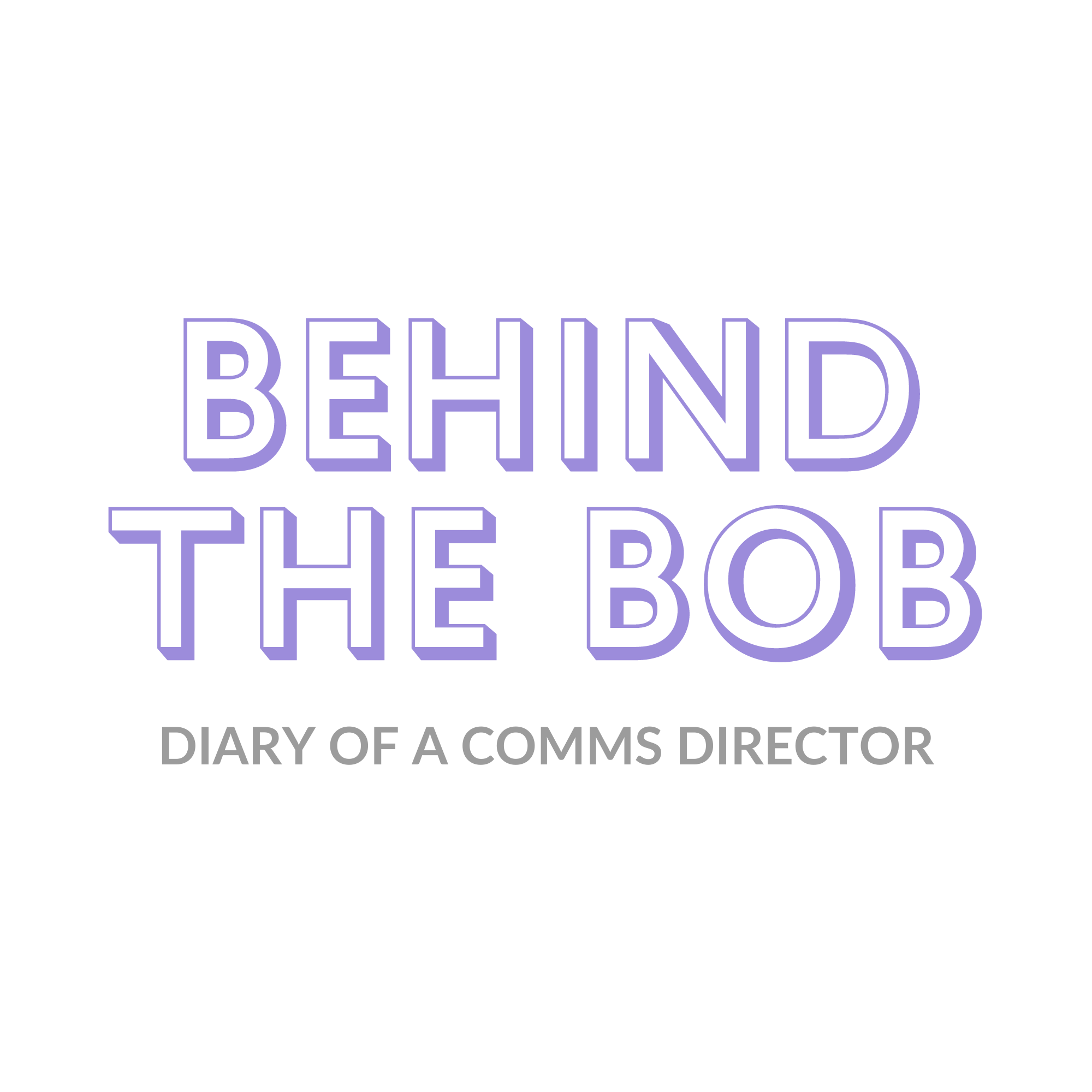Behind the Bob - through times of change
In this episode of Behind the Bob, Diary of a Comms Director, Carrie-Ann Wade shares her thoughts and reflections on what you might want to consider during times of change and uncertainty.
01:31 - your role as a leader in your organisation
05:00 - intuition and empathy
05:33 - your role with your communications team
08:55 - impacts on you as an individual
10:11 - your support network
In challenging times, comms directors take on numerous roles, often providing support, advice and counsel to other leaders. In this episode, Carrie-Ann encourages you to ensure you have a strong support network in place to help you when you need it. Change impacts you too!
----------------------------------------------------------
Thank you for listening to this episode. If you enjoyed listening please share it, leave a rating or a review.
New episodes of Behind the Bob are published every Wednesday and you can always subscribe via your favourite podcast platform to ensure you don't miss an episode.
You can find out more about Carrie-Ann and Cat's Pajamas Communications at www.cats-pajamas.co.uk
Transcript
Carrie-Ann Wade: Welcome to Behind the Bob Diary of a Comms
Speaker:Director with me, Carrie-Ann Wade.
Speaker:This podcast is all about developing communications leaders of the
Speaker:future and supporting you to grow and thrive in your comms career.
Speaker:You'll hear from me about my experiences and insights, and there might even
Speaker:be a special guest or two popping up.
Speaker:So I hope you enjoy.
Speaker:Welcome to the latest episode of Behind the Bob, Diary of a Comms Director, with,
Speaker:yes, you've guessed it, me, Carrie-Ann.
Speaker:This is one of those solo episodes, so there's no guest with me today.
Speaker:I won't be having a deep and meaningful conversation with another
Speaker:amazing communications professional.
Speaker:But I will be sharing briefly some of my thoughts and reflections on a
Speaker:topic that I think is really important for us working in communications.
Speaker:And that topic this week is around change and uncertainty.
Speaker:As you will know, we live in uncertain times, and managing change and uncertainty
Speaker:is probably one of the only things we can be most certain about in our
Speaker:roles as communications directors.
Speaker:Whether that's a change in direction or strategy for the organisation we work
Speaker:for, or possibly a change in leadership, it can actually take many guises, but
Speaker:I'm sure will have similar impacts.
Speaker:As a Communications Director, it feels to me like there are a number
Speaker:of different roles we need to take when we're leading through change.
Speaker:And the first area I wanted to reflect on is what your role as a leader
Speaker:in your organisation means for you as a Director of Communications.
Speaker:While you are there to represent your function and provide sound, expert
Speaker:communications advice, you're also part of that leadership team in your
Speaker:organisation, and that can sometimes move you beyond your remit as comms lead.
Speaker:If you've listened to the previous episode I've recorded about communications leaders
Speaker:making great leaders in general, I think some of that comes into its own here.
Speaker:When your organisation is undergoing change, your board
Speaker:will look to you to support them in answering some key questions.
Speaker:Questions like, what's the likely impact of this change on our key
Speaker:internal and external stakeholders, and how do you think this will land?
Speaker:What can we do to alleviate some of the concerns and anxieties that may be
Speaker:raised through this period of change?
Speaker:And how do we bring people on the journey with us to implement the desired outcomes
Speaker:from the change that we're proposing?
Speaker:Now these questions will of course have different answers based
Speaker:on your organisation and the change that is being discussed.
Speaker:From a communications point of view we would probably all advise similar
Speaker:things and we would ask the board to consider similar questions to help
Speaker:us to develop our comms approach.
Speaker:And, of course, there will be the usual communications outputs that will be
Speaker:discussed in these conversations, such as the provision of frequently asked
Speaker:questions, briefings, face to face meetings, the list I know goes on.
Speaker:I think we all know as communications leaders how we would support and advise,
Speaker:because we are, of course, the experts.
Speaker:The bit that I think is useful for us to remind ourselves of in this
Speaker:situation is to operate beyond comms.
Speaker:We are part of the senior leadership team and as well as holding up the
Speaker:mirror to our peers in this space and helping the board to seek clarity on
Speaker:those questions, we also have a duty to role model positive leadership
Speaker:behaviours and to constructively offer some challenge into this space.
Speaker:As a leader, we might need to consider the impacts of the uncertainty and
Speaker:change on the other leaders in the organization and try to understand
Speaker:how this might play out in terms of their behaviors and contributions in
Speaker:the leadership team and discussions.
Speaker:There may well be anxieties playing out as people question values
Speaker:alignment to a potential new direction of travel, or perhaps worry about
Speaker:the impacts of a new boss on their portfolio and their deliverables.
Speaker:It might be something that's just bubbling there underneath the surface,
Speaker:or it might be playing out really loudly in conversations and discussions.
Speaker:This is a crucial time for you to consider your role as a leader alongside
Speaker:being the expert strategic communicator as you may need to facilitate and
Speaker:advise on a sensible way forward.
Speaker:I've often found myself at times of significant change being the person in
Speaker:the leadership room that asks what might be perceived to be the stupid questions.
Speaker:Not because I think they are stupid, but because sometimes it takes the
Speaker:communications leader in the room to take on that role of trying to tease
Speaker:out how people are feeling, how things are landing, and if everyone is in the
Speaker:right space to be able to take forward the proposed changes in a way that
Speaker:will be supportive and engaging for those people in the wider organisation.
Speaker:The good communication leaders that I've had the privilege to work with
Speaker:have had great intuition and empathy and have the ability to diplomatically
Speaker:feedback into their leadership teams their observations of how change
Speaker:is being perceived and managed.
Speaker:I often feel like it's my role to articulate and share what could be
Speaker:perceived as the elephant in the room and suggest that we try to address it.
Speaker:Otherwise a leadership team trying to provide assurance through an unsettling
Speaker:time will face an even bigger challenge.
Speaker:The next area I wanted to briefly explore is your role of course as a Communications
Speaker:Director with your own team.
Speaker:Those same anxieties and concerns may well be playing out for your team
Speaker:members when things feel uncertain or the organisation is undergoing change.
Speaker:When your whole team has a role in communicating that change to the wider
Speaker:organisation, and perhaps even to external stakeholders, it's even more important to
Speaker:be curious and understand their needs in order to be able to do this effectively.
Speaker:Ask your team the following questions.
Speaker:How are you feeling about the changes?
Speaker:What do you need from me to support you at this time?
Speaker:And what do you need from the organisation in terms of support?
Speaker:We can have these conversations as a wider comms team, or as a smaller sub
Speaker:team if you have them in yours, for example in your comms management team.
Speaker:And of course, you can have these conversations with individuals,
Speaker:remembering that people will want to engage with you in different ways.
Speaker:Some of the asks I've heard from my teams on occasions when we've been dealing with
Speaker:change are for really practical things to help us do our comms job effectively.
Speaker:For example, I've heard people ask for really clear key messaging.
Speaker:They've asked who's going to be signing the comms off and who's going to be
Speaker:fronting key meetings, for example.
Speaker:But many of the asks from team members have been about things like how will this
Speaker:change impact what I do going forward?
Speaker:What will be different for me?
Speaker:What will stay the same?
Speaker:And will our team have new priorities and how might that affect my job?
Speaker:It's natural for people to be anxious and to have these types of questions.
Speaker:Some of the team will see change as an opportunity to do things
Speaker:differently, maybe to try new ideas and be more innovative.
Speaker:While others will see change as a potential threat to the
Speaker:status quo and something that makes them feel uncomfortable.
Speaker:It's important to make the space and time to work through this with
Speaker:your team, especially given the role of comms in change management.
Speaker:It's also important, and I will say there's a caveat for this, and
Speaker:probably most of this conversation, that caveat being that I've made
Speaker:an assumption you're operating in a culture that's open and transparent
Speaker:and where people feel safe to share.
Speaker:But as I was saying, it's important that you are honest and upfront.
Speaker:If you don't know what the impacts of the change might be for your
Speaker:team, or you don't have clarity, then be honest about that.
Speaker:And commit to sharing what you can, as and when you're able to do so.
Speaker:I mean, these are all principles of good communications, I know.
Speaker:I do think there's a misconception, however, that when you work in comms, you
Speaker:know everything before anyone else does.
Speaker:And sadly, in my own experience, that is not always the case.
Speaker:Uh, perhaps I should even say that's not often the case.
Speaker:Of course there will be times when we have information, as we are
Speaker:part of the leadership team, that we're not at liberty to share.
Speaker:And that's okay.
Speaker:As long as we're being open and transparent about the things that
Speaker:we can share, listening to people's concerns, and finding ways to respond to
Speaker:them either individually or as a team.
Speaker:And of course, coming from a genuine place to really want to help people work
Speaker:through that change and uncertainty.
Speaker:Finally, I wanted to reflect on how change and uncertainty
Speaker:impacts on you individually.
Speaker:It's really easy for communications directors to feel the need to just
Speaker:get on with things, but my own experience has taught me it's important
Speaker:to create the time and to seek the support you need to process and work
Speaker:through those changes for yourself.
Speaker:As comms directors, we are often in the privileged position where we are
Speaker:trusted advisors to our leadership teams, confidants to other leaders in
Speaker:our organisations, sounding boards for people to test out ideas, and sometimes
Speaker:even a therapist, as well as, of course, being a professional communicator.
Speaker:While this signals that others trust us and we have built strong
Speaker:relationships, don't underestimate the toll that absorbing the emotions
Speaker:and feelings of others can take on you during times of stress and
Speaker:uncertainty in your organization.
Speaker:It's really important to carve out the time and space to reflect on
Speaker:how you feel about the changes.
Speaker:Ask yourself some of those same questions that you would ask others in your team.
Speaker:What impacts might the change have for you personally, are there
Speaker:opportunities, and equally are there things that you feel concerned about?
Speaker:Having a strong support network here is crucial.
Speaker:Whether that looks like a handful of trusted peers or colleagues, maybe some
Speaker:of your close friends, or perhaps more formal arrangements through a coach or
Speaker:a mentor, being able to talk through the impacts of change and how you might
Speaker:choose to manage it will really help you.
Speaker:At many points throughout my career as a comms leader, I've needed to sense
Speaker:check things, test out my thoughts, download some of my own stresses,
Speaker:and to create some head space to consider my next steps in working
Speaker:through change, both professionally and personally, as the comms lead for
Speaker:the organisation, as the leader for my team, and of course for myself.
Speaker:Having some hugely trusted people in my network to do that with, as well
Speaker:as my coach when I needed to, and my mentors, has genuinely helped me.
Speaker:Whether that has been reframing my thinking, checking on values
Speaker:alignment, or considering what impact I feel I can have as a leader,
Speaker:it's all been hugely beneficial.
Speaker:So I'll end this episode by saying, at those points when we face change and
Speaker:uncertainty, don't forget that people will be looking to you to provide
Speaker:that expert communications advice.
Speaker:Don't forget that people will also be looking to you as a leader to role model
Speaker:good behaviours and provide assurance and reassurance where you're able to.
Speaker:But most importantly, I would say at any time of change or uncertainty,
Speaker:don't forget to look after yourself.
Speaker:Thank you for listening to this episode of Behind the Bob.
Speaker:I'd love for you to subscribe on your favorite podcast platform
Speaker:and leave a rating or a review.
Speaker:You can also engage with me over on the socials.
Speaker:You can find me on Instagram and on Twitter at @catspjs_uk.
Speaker:Catch up soon.


